
Related
Topics
We look at the case of Iraqi CBS cameraman Abdul Ameer Younis Hussein. He was shot by U.S. forces while working in Mosul then detained for a year in Abu Ghraib without due process. We speak with Scott Horton, a New York attorney who flew to Baghdad to help defend Abdul Ameer. [includes rush transcript]
We turn now to Iraq. Violence and kidnappings continue to wrack the country and the dangers posed towards reporters covering the war are greater than ever. When Western journalists like Jill Carroll are taken hostage by Iraqi insurgents they appropriately receive international media attention, condemnation from across the globe and worldwide calls for their release.
But when Iraqi journalists are detained by US forces the story is a very different one.
Just consider the case of CBS cameraman Abdul Ameer Younis Hussein. In April 2005, he was shot in the hip by an American sniper while filming the wreckage of a car bomb in Mosul. US troops then detained him, claiming he had tested positive for explosive residue and that images in his camera linked him to the insurgents.
He was imprisoned in Abu Ghraib for more than a year without due process.
Abdul Ameer was released just last week after an Iraqi criminal court acquitted him of collaborating with insurgents, citing a lack of evidence. No charges were made public until the trial itself.
The case is not an isolated one. The Committee to Protect Journalists documented seven cases in 2005 alone in which U.S. forces detained Iraqi journalists for many weeks or months without charge or due process.
- Scott Horton, a New York attorney who recently returned from Baghdad where he was working on Abdul Ameer’s case. Horton is Chairman of the International Law Committee at the New York Bar Association.
Transcript
AMY GOODMAN: We’re joined in our Firehouse studio by Scott Horton. He is a New York attorney who just returned from three weeks in Baghdad, where he was working on Abdul Ameer’s case. Scott Horton is chair of the International Law Committee at the New York Bar Association. Welcome to Democracy Now!
SCOTT HORTON: Good to see you.
AMY GOODMAN: So, you went to the gates of Abu Ghraib to free the CBS cameraman?
SCOTT HORTON: I did, yes. After the decision of the Iraqi court was handed down acquitting him, actually finding there was not a shred of evidence supporting the charges that were brought against him, they ordered his release, but he was still carried in manacles back to Abu Ghraib, because his release depended upon the U.S. forces. But fortunately, in this case, they acted very quickly, and within about a day, he was released.
AMY GOODMAN: Do you think it helped that you were there, that CBS was involved with this, as well, to get him out?
SCOTT HORTON: Well, I was told by a number of Iraqi lawyers and some of the judges that that made a critical difference.
AMY GOODMAN: He was held for a year?
SCOTT HORTON: That’s correct.
AMY GOODMAN: Explain what happened the day he was shot by the U.S. forces and taken to prison.
SCOTT HORTON: Well, he was shot, and I think the immediate assumption was it was a mistaken shooting, that, you know, the sniper was aiming for or targeting perhaps another sniper or a gunman or something like that at the scene, and mistakenly hit this cameraman.
AMY GOODMAN: Now, he had just raced to the scene of this car bomb?
SCOTT HORTON: That’s right. After he had gotten a tip from an A.F.P. reporter —
AMY GOODMAN: Agence France-Presse.
SCOTT HORTON: Exactly, that the event had occurred, and he got there about 30 minutes after the incident, and it’s just as he picked up his camera and started to film that he was shot. Within about 48 hours, there were announcements made, basically saying, 'It was a mistake. We're very sorry about this. He is being treated and will be released shortly.’
But then, very disturbingly, about five or six days later, suddenly reports began to circulate, not in Iraq, but in Washington, D.C., amongst Pentagon correspondents for CNN and other major networks, FOX News, as well, quoting unnamed, unidentified official Pentagon spokesmen, saying that the Pentagon had extremely disturbing evidence that this man was a terrorist. And specifically, they said that he had on his videotape camera four separate incidents involving attacks on U.S. forces, where there was clear evidence of prior knowledge, that he was there before the attack itself actually occurred, filming.
Of course, when the trial came, we discovered that this was a lie. No other way to put it. We got the tape. We examined it. In fact, the tape helped exonerate him, because it corresponded exactly to his account of what had happened and directly contradicted all the claims that had been put forth by or on behalf of the U.S. forces.
AMY GOODMAN: You know, it’s very interesting, I was at a Reuters seminar session with journalists and with the former spokesperson of the U.S. military forces in Iraq, asking questions about journalists killed and detained, and as we spoke last week, he said, “Well, there is no journalist who is held now,” but, in fact, he was being held, the CBS cameraman, at that time. When did you have him released?
SCOTT HORTON: He was released last Thursday.
AMY GOODMAN: So he was in Abu Ghraib for the whole time, for the year?
SCOTT HORTON: He was in Camp Buka for the first several weeks, and then he was moved to Abu Ghraib, and I think it’s important to note while he was in Abu Ghraib, he was subject to very vigorous interrogation sessions, going 18 to 20 hours, usually beginning at 2:00 in the morning. And there was an attempt made to break him, to get him to make or sign confessions that he was a terrorist, and at the end of one of these interrogation sessions, he was told, “We don’t accept what you’re saying, and we’re going to put you in solitary confinement forever, until you break and sign a statement confessing to being a terrorist.” He was held, in fact, for two days in solitary confinement, which is completely illegal.
AMY GOODMAN: Now, we watched a lot, for example, about Jill Carroll, as we should have, as every detained person we should pay attention to, but I don’t remember seeing reports on CBS about their own cameraman.
SCOTT HORTON: Well, there was one report right at the beginning, and there were a couple of reports that were carried in CBS’s internal weblog, but I think you’re right, of course, it didn’t get the level of dramatic attention that Jill Carroll’s story got.
AMY GOODMAN: I mean, compare it to Christian Science Monitor. Christian Science Monitor, if CBS argues that, you know, you don’t cover yourself. I mean, they were extremely aggressive about putting out there constantly information about Jill Carroll, to make sure she was in the eye of the international media, which would protect her.
SCOTT HORTON: Well, of course, one difference, Amy, is that people had some information about Jill Carroll, and there was effectively an information barricade surrounding Abdul Ameer. So CBS tried over and over again to get information about his case, to learn what was happening to him, and they were completely shut off. So there was nothing to report, really.
AMY GOODMAN: What about this is emblematic of how Iraqi journalists are dealt with?
SCOTT HORTON: Well, I think that this is the case, I’d say, in two ways, really. I mean, Jill Carroll is the unusual case of an expatriate journalist who is actually out there working in the field. For the most part, the situation in Iraq is simply too dangerous for expatriates to deploy them to forward positions and cover things. So they are mostly in fortified, highly secure locations, and they travel out with security guards to do an interview a couple of times a week, but that’s it. It is local-hire Iraqi journalists who are really on the front line of the conflict, covering the most dangerous situations, and, you know, we have had 80 journalists killed so far. I think the C.P.J. count is a little bit lower, because of the methodology they use, but these are Iraqi journalists who had been killed, and the wounded, likewise, are largely Iraqi or other Middle Eastern journalists.
AMY GOODMAN: We’re talking to Scott Horton, chair of the International Law Committee at the New York Bar Association, who represented the CBS cameraman who was just released this past week. Now, you lived in the Red Zone?
SCOTT HORTON: I lived in the Red Zone, that’s right.
AMY GOODMAN: That’s outside the Green Zone.
SCOTT HORTON: Absolutely correct.
AMY GOODMAN: What is it like to be there for three weeks?
SCOTT HORTON: Well, I was on Haifa Street, which is not a safe place in Iraq. In fact, it’s been the site of battles for some time. And I would say, just to start with, it’s difficult to sleep there. I don’t understand how the locals do it. I mean, you hear helicopters cruising overhead every morning between 3:00 and 5:00 constantly. Gunfire bursts, bombs, and so forth. It’s very disturbing.
AMY GOODMAN: Did you go to the home of Abdul Ameer Younis Hussein?
SCOTT HORTON: I did not go to his home, but I did deliver him to his family members.
AMY GOODMAN: How did it affect them, losing him for a year?
SCOTT HORTON: Well, they were distraught by the entire situation. I think they felt that he had been targeted, he had been shot, and he had been imprisoned, because he was a journalist, and there was, I think, a lot of resentment about that.
AMY GOODMAN: What did he say when you went up to the gates of Abu Ghraib?
SCOTT HORTON: Well I, of course, interviewed him at some length before we had the trial, and he was — I think he was distraught about the situation. He didn’t understand it. I mean, he really did not understand why U.S. forces had captured him, why they had imprisoned him, why he was being interrogated. It didn’t make any sense to him whatsoever, and, you know, he just clung to the truth and giving a correct, objective account of what happened, and I think that worked out very well for him at the end.
AMY GOODMAN: Let’s talk about Abu Ghraib for a minute and the latest news of — I think we’re up to general six, who has called for the ouster of Donald Rumsfeld.
SCOTT HORTON: Well, that would be general six in the current series, of course, because if you think back to the first breaking of the Abu Ghraib scandal and the issuance of the Fay-Jones report, you’ll note there were quite a number of generals who called for Rumsfeld’s resignation at that time, but, you know, there is clearly a very careful drumbeat now of retired officers. This is something that’s completely unprecedented.
AMY GOODMAN: What about responsibility at Abu Ghraib? When we last talked, we were talking about the chain of command. What has happened to the man who was sent to Abu Ghraib to — what? — Gitmo-ize it, to make it like Guantanamo, General Miller, General Sanchez?
SCOTT HORTON: Well, Geoffrey Miller is the man who was sent to Abu Ghraib to Gitmo-ize, and we know that Lieutenant General Mark Schmidt did an investigation of what he did, not at Abu Ghraib, but at Guantanamo, and recommended that he be disciplined, and that decision was overridden higher up in the Pentagon. Then, as a result of demands from the Senate Armed Services Committee, an Inspector General’s investigation into that entire process was undertaken. The Inspector General’s report is going to be issued very shortly, and it, again, supports the decision to exonerate Major General Miller. I have had some opportunity to look at it, and I will have some opinions to express on it when it’s released, but I would say it doesn’t inspire confidence in the independence and work of the Inspector General.
But I think most importantly here, the Pentagon has said that Major General Miller will be retiring, and members of the Armed Services Committee have said, “Not so fast.” They put a hold on his retirement. That never happens, I mean, and it suggests, again, the level of concern about what’s happened and about lack of accountability of senior officers for what happened.
AMY GOODMAN: Why are they saying they won’t let him retire?
SCOTT HORTON: Because when he retires, he will be able to retire with his rank and his pension and benefits, and Major General Miller, of course, has invoked the Fifth Amendment in criminal proceedings already, which is unprecedented, really, and I think is something that appalled a number of other flag officers, and he’s escaped any punishment for what went on, although he seems to be quite right at the center of it, and there is, I think, a very strong sense that this is not correct.
AMY GOODMAN: So the only one who has been punished at this point is — what? — formerly Brigadier General Janice Karpinski? The highest up?
SCOTT HORTON: That’s correct. She was not punished on account of what happened at Abu Ghraib, though. She was punished for something else in her background, so, really, you know, in terms of court-martials, we’re talking about NCO’s.
AMY GOODMAN: Non-commissioned officers.
SCOTT HORTON: Exactly, non-commissioned officers. We do have a couple of other officers who will be subjected to court-martials or are in the process right now, like Lieutenant Colonel Jordan, but at the flag officer level, there has been a really astounding failure to act and hold to account.
AMY GOODMAN: And the lawsuit that was brought against Rumsfeld in Belgium by U.S. attorneys, were you involved with that?
SCOTT HORTON: I was not involved in that, but I think it’s in Germany that you’re thinking of. That was a criminal complaint that was brought against Rumsfeld in Germany, and the German prosecutors concluded that it was too early, that, in fact, it was too early to say that the criminal process would not play itself out in the United States. So the door was quite clearly left open for a future prosecution.
AMY GOODMAN: Well, Scott Horton, I want to thank you very much for being with us, chair of the International Law Committee at the New York Bar Association, just back from three weeks in Iraq, where he went to Abu Ghraib to free a CBS cameraman who had been held there by U.S. forces for a year. Abdul Ameer Younis Hussein is now free.

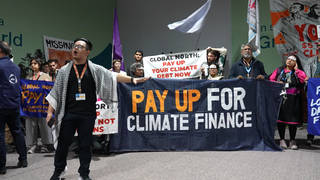
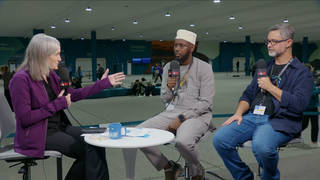
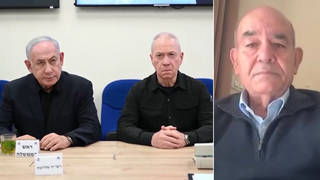
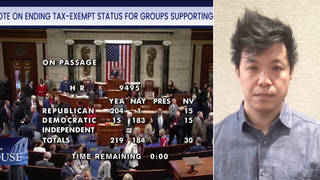





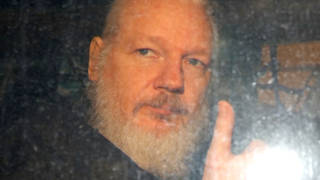
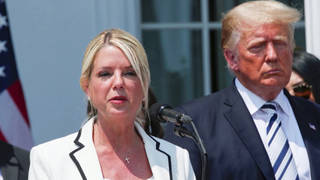
Media Options